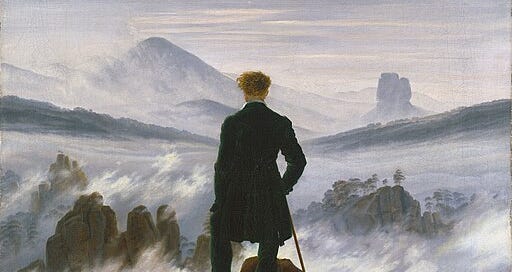Spensoir.
In this month’s essay, I discussed our shared desire to move on from debunking atheism and to begin to explore the nature of belief. What do we really believe and how, then, shall we live?
I don’t just want to have an alternative worldview to scientific materialism. I want to experience it. And I believe the great successes of material practices like science, technology, capitalism and democracy have blinded us to the higher reality that matter represents.
So we’ve talked about the nature of the body and the stories we tell that hint at the fact that bodies, and all matter, are a language expressing higher truths than themselves. But as you say, the great question is whether — and how — we live out the stories we tell.
You wrote something in Monday’s letter that I temporarily passed over. I want to return to it. You wrote: “You ask how we live eternal life in this rough and solid world of ours… The trick for me is not to abstract away from the present moment but to hurl myself so totally into it that this essay, this embrace, this meal, becomes as much of heaven as I am currently capable of receiving.”
My immediate, and probably irritating, response was: “Yes! But also no.” Of course, it is the fiery essence of the instant we’re trying to get at, always. “To be united with the beauty we see, to pass into it, to receive it into ourselves, to bathe in it, to become part of it,” as Lewis says.
But Lewis noted, too, that this desire is always experienced as an unfulfilled longing, that sweet, painful longing “to find the place where all the beauty came from.” So much in life seems to block the way. Pain, suffering, death and desire. The impossibility of being and knowing at once. The memory and dreams that take us out of the moment, but without which the moment is never complete.
This is why I think the poetry of Keats is ultimately deeper than the poetry of Wordsworth. Like Wordsworth, Keats writes about the yearning to unite with the eternal, but almost always, after the briefest ecstasy of unity, “the weariness, the fever, and the fret” of mortality draws him back into himself. This is life as I know it, despite all the mitigations of faith.
Ritual — living the story — helps. Communion, charity, liturgy. I really believe and trust that these can train the mind to live the eternal in the moment. Even so, matter and meaning always seem at odds.
That is my complaint about morality that is higher than our humanity, about sexual rules that make metaphorical sense but immiserate us in real life, about theologies of judgement that don’t actually reflect our full sense of God’s forgiving goodness.
Jesus offered us joy and life in abundance. Then he said: Take up your cross and follow me. There is a profound paradox here that can’t be untangled with easy answers.
Love, Dad





Dare I say that Heavenly Father wants us to receive more and more of heaven on earth as we live the Gospel of His Son. More joy in our redemption, more joy in our posterity, more joy in service, more joy in the glad tidings of the Atonement of Christ. We were made for joy but in this life our joy is not full. Eternal life is a gift to desperately long for, live worth of and desire with all our heart. And in the mean time, the in between time, we live, we love, we laugh and keep the flame of faith burning brightly. Peace to all you followers of Christ, children of light.
Yes, urgently--"I believe! Lord, help my unbelief..."